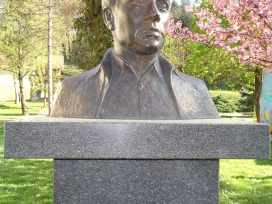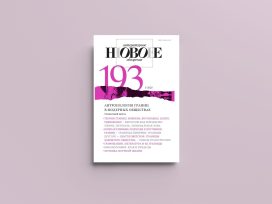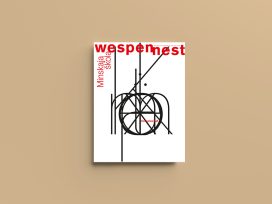Culture is probably the only area of human activity that knows no limits; hence, international cultural communication is, in itself, a key determinant of any culture. This also means that literature is unique. Macedonian literature has long transcended national borders, and has become a European occurrence, so to speak. The latest literature produced in Macedonia (2008/2009) confirms this.
This past year has been marked by the biggest publishing project in Macedonia ever: the publication of 130 volumes of Macedonian literature, representing a distinguished selection of Macedonian literary authors and works from the beginning of our literacy up until the present day, funded by the government of the Republic of Macedonia. Although we are not talking about new literary production, the selection gives a fine view of the history of Macedonian literature from ancient times until modern days.
The dominant genre in contemporary Macedonian literature is undoubtedly the novel. The popularity of the novel is probably due to readers’ increased interest in the form, which is also noticeable on a wider, global scale. Fiction, especially via the art of film, has become an essential part of the public sphere; it is experienced as the contemporary way of living, as in the famous old saying: “Novels reflect life”. Every person in his or her life fills out a novel, and the awareness of the unity between letters and life has never been so widespread. It would seem that this is the main reason for its popularity with readers and authors themselves.
Suffice it to mention that over 30 novels compete every year for one of our most prestigious awards – the Novel of the Year award – awarded by the daily newspaper Utrinski Vesnik since a whole decade. Although quantity does not automatically mean quality, it is precisely in this shortlist that they can be most easily distinguished. This year the award went to Jagoda Mihajlovska-Georgieva (1953), for the novel Indigo Bombay (2008).
India! Who does not remember the exhilaration with which Walt Whitman wrote his poem “The Passage to India”, in honour of the road that circled the world, starting in India in the East, and his vision of the overall connection of the world? The Passage to India – who does not remember the Oscar-winning cult film by David Lean of 1985? Basing the script on E.M. Forster’s literary work, Lean manages from the start to announce the mystery, the terrifying prospect of the unknown, but also its peace and beauty, boundlessly appealing, causing one to wander into the unknown labyrinths of one’s own soul. “India makes brings one face to face with oneself, and that can be very disturbing”, says a female character. It is precisely this idea on which Jagoda Mihajlovska-Georgieva’s novel Indigo Bombay feeds.
We are talking about a novel that has as its subject the question of human identity and the meaning of existence, told through a warm story about self-discovery in the spiritual labyrinth of a single, seemingly distant philosophy of life and existence. The story in Mihajlovska-Georgieva’s novel weaves itself around two greatly different destinies that are about to intertwine. First, that of the little boy Garuda, who agrees to sell his own kidney so that he can buy his mother sandals; and second, that of Ana, a sensitive tourist, a foreigner, living the characteristic magical realism of her ordinary, everyday life. We see unravelling in front of us a multifold story about Indian reality, with themes like organ transplantation, donation or selling, as well as issues of poverty versus health and health versus morality.
Through her own original vision of India, Mihajlovska-Georgieva gets involved in a broader cultural code, one that is very true in our times and within international frameworks. Let us remember that last year Danny Boyle’s film Slumdog Millionaire, yet another Oscar-winner, confirmed that India is an appealing topic for a literary elaboration.
Traditionally, female writing is connected to poetry whereas prose, especially the novel, has long been reserved for men. Summarizing conditions in Macedonian literature since 2000, one will come to the conclusion that, apart from Mihajlovska-Georgieva, three other women have received this award: Olivera Nikolova, Kica Kolbe and Lidija Dimkovska. And this year, we witnessed the publication of two new novels by two of these women authors: Kica Kolbe (The Women of Gavril, 2008) and Olivera Nikolova (White Smoke, 2009). Are we seeing the beginning of the end of the myth about male predominance in this genre?
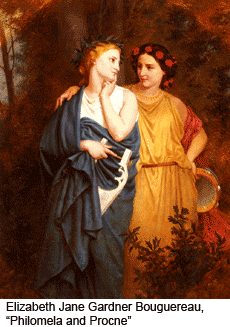 The Women of Gavril can be read as a metaphor about the fatum of creation and its meaning, having as its topic the most female of all artistic skills – weaving. To weave, according to the dictionaries of symbols, means to create things out of their own essence – much like the spider creates its own web. The ancient Greek myth about the Thracian king Tereus, his wife Procne and her sister Philomela is considered to be a parabola of the archetype structure of female writing, precisely because of the woven encrypted message by Procne. Tereus, suddenly in love with Philomela, pronounces Procne dead, locking her up among the women slaves and ordering her tongue to be cut out, so that she cannot tell anyone about her destiny. This literary trait – woman and the art of weaving – is also present in the myth about Arachne, or Homer’s Penelope, who undid at night the things she was weaving, so that she could buy some time, and similarly to Scheherazade and her stories deliberately left unwoven from night to night.
The Women of Gavril can be read as a metaphor about the fatum of creation and its meaning, having as its topic the most female of all artistic skills – weaving. To weave, according to the dictionaries of symbols, means to create things out of their own essence – much like the spider creates its own web. The ancient Greek myth about the Thracian king Tereus, his wife Procne and her sister Philomela is considered to be a parabola of the archetype structure of female writing, precisely because of the woven encrypted message by Procne. Tereus, suddenly in love with Philomela, pronounces Procne dead, locking her up among the women slaves and ordering her tongue to be cut out, so that she cannot tell anyone about her destiny. This literary trait – woman and the art of weaving – is also present in the myth about Arachne, or Homer’s Penelope, who undid at night the things she was weaving, so that she could buy some time, and similarly to Scheherazade and her stories deliberately left unwoven from night to night.
Thus, the lives of the three “cursed” women of Gavril – Nika, Lina and Demiana – are completely determined by the symbolism of the loom, yarn and thread, cloth and fabric… Of the three, only the youngest, Demiana (her name alludes to the Hesse’s Demian), after a long yet successful Jungian search for identity and insight into the secrets of her mother and grandmothers, is able to relieve herself from the family curse and the burden of the past.
The most intimate and delicate axis in this novel, as in all of Kolbe’s works, is the axis of identity, of homing. According to critic Jelena Luzhina, “Her women (and men too) encounter problems and conflicts with homing of any kind: feeling at home in the places they live, feeling at home with the languages they speak, feeling at home with the cultures they move through or carry within them.” It is precisely in the question of identity where the authors of the three aforementioned novels meet.
Olivera Nikolova’s novel White Smoke, at one level a police investigation into the tobacco mafia and people trafficking, at another level explores the question of “otherness”: do we know each other, and if so how well? Macedonians and Albanians, refugees from Bosnia: we share the same space, we live the same life as human beings, but we persist alongside and not together with one another. Nikolova’s novel promotes the idea of equality of identities, so necessary in our time on a global scale, through its account of the crossing of the life paths of one Macedonian and one Albanian. Living on the edge of the law, they are antiheroes for our time, or to put it otherwise, outsiders set at the very margins of the society. Her message is that meeting halfway and collaboration is the only salvation for the Balkans.
The title itself – White Smoke – although referring to the “pleasures of inhaling tobacco smoke”, is also a metaphor about life: “The more we inhale the closer we get to our end, and yet we are all endlessly in love with that pleasure.” The smoke implies an illusion – as, ultimately, everything is. The author plays, very successfully, with the power of illusion in the relation between literature and life. What is real and what is imaginary? Where does one end and the other begin? Is life just an illusion? Is literature more real than life itself?
The masks are off. Nikolova responds to this bizarre world with bizarreness. Do we really live our real life, and if so how much? Is what we live just the illusion of that life? “Is it enough to be a woman to be able to speak like a woman?” This dilemma, established by feminist literary critic Shoshana Felman, is involuntarily posed when encountering Dragi Mihajlovski’s latest novel Bayezid and Olivera (2009). The writer offers the reader a game of identity, in that the voice of the narrator, who has been assigned a dominant function in the prose discourse, is actually the voice of the Other, the voice of the female subject. In fact, every author has a double identity: a personal identity and one that is realized through the text.
Mihajlovski writes the novel from the standpoint of Olivera, the youngest daughter of Tsar Lazar and Tsarina Milica. After the Battle of Kosovo in 1389 and the death of her father, Olivera gets married according to her mother’s will to Sultan Bayezid I. This is the historical framework around which Mihajlovski structures his fiction, his personal vision, totally separate from the historical facts, from which he distances himself. In literature, Mihajlovski’s novel falls into the category of literary works that oscillate between fact and fiction. We are talking about a literary technique that turns historical facts into aesthetic creations, thus recreating them, as well as enriching the memory of specific historical characters.
It is possible to make the general observation that current prose tendencies in Macedonian literature are marked by techniques of intertextuality and variations of luddism. An especially lucid example of such a game is offered in the latest novel by Vlada Uroshevic, one of the most renowned writers in the Macedonian literary scene. The Dragon’s Bride (2008, winner of the Stale Popov award for best prose work, awarded by the Society of Macedonian Writers) is a novel that represents the miraculous accord between the archaic and the modern – or, in T.S. Eliot’s terms, between “tradition and innovation”. The synthesis is accomplished both thematically and stylistically. The author skilfully plays with the duality of sacred and profane with his typical “unbearable lightness” of narrating, boldly following in the narrative traditions of Cepenkov (folklore) in a postmodern (erudite) manner.
Macedonian poetry, although in the shadow of the novel, is still one of the most interesting phenomena of our literary life. Ever since the founder of the contemporary Macedonian poetry Kocho Racin’s (1909-1943) book of poetry White Dawns (1939), poetry has depicted its own original and very specific trajectory on the map of the European and world literatures, passing through several stages of development. The current postmodern period (which includes the last two decades) is reflected in a particular manner in the domain of poetry. Today, due to pluralism of ideas, emotions, and discourses, we can no longer single out one dominant poetry movement, a leading type of recital, or trends in the system of the new Macedonian poetry. In other words, no general determination point can be identified in the relation between the individual and the world. Naturally, in the domain of poetry, this will manifest itself as plurality of expressions and messages. In the “Babylonian variety of voices” of contemporary Macedonian poetry, many different models of the poetic discourse can be recognized, different poetic alphabets with different sensibilities, a completely individualized expression.
Among the poetic anniversaries of 2009, we should mention that Mateja Matevski and Gane Todorovski celebrated their eightieth birthdays, and Bogomil Gjuzel his seventieth. The creative Eros knows no old age. On the contrary! Even the dominant tendencies among young authors creatively follow the established tradition of the three aforementioned poets, nowadays classics of Macedonian poetry. Each provides a paradigm of recital: the referential discourse (Todorovski); the moderate lyrical expression (Matevski); and the poetics of rebellion (Gjuzel). Only in that way can Macedonian poetry achieve continuity and guarantee itself a future.
It is in this connection that we should point out one of the most talented Macedonian poets of the younger generation – Lidija Dimkovska. This year, Dimkovska won the prestigious Hubert Burda prize, an international award that just two years previously was given to another young Macedonian poet from the same generation, Nikola Magjirov. Dimkovska’s poetry blends poetic expression with scientific language, an intellectual game of creation and meta-creation. Her latest collection, called pH Neutral of Life and Death, highlights Eros and Thanatos as the two essential existential tattoos of every person.
Since we are talking about poetry prizes, we cannot but mention the most prestigious of all in Macedonia – the Miladinovci Brothers prize of the international Struga Poetry Evenings, awarded for poetic achievements in the period between the two festivals. This year, the award went to Vesna Acevska for her collection Stolisnik (One Hundred Leaves, 2008). The title implies the individual in the multitude (the number 100 contains the number 1), the blend of the micro- and the macrocosm, and the accord between the individual and the universe as a whole.
The subtitle of Stolisnik is “Dialogues”, and at the end of the book there are “notes” in which the author explicitly evokes the literary ancestors that have left a mark on her poetic vision, a reference point for the specific source of a certain poem, or the motif that acted as the trigger in its creation. In that way, each poem becomes stolisnik (made up of one hundred leaves): each poem is related to other poems, and the poem itself remains open for new dialogue; it is as if there is a continual filling in of one and the same palimpsest. Poetic expression, like any other artistic creation, is open for communication with past and future texts in an established set of kinship relationships.
Stolisnik confirms Acevska’s dedication to language, the poetic word and its meaning/world. The same goes for Katica Kjulafkova (1951), who this year won the Literary Sceptre poetry prize, awarded by the Society of Macedonian Writers. “The language of [Kjulafkova’s] poetry, from her early verse until today, is the language of resistance and the language of the festival, the language of sorrow and joy, the language of the past but also the language of the future,” said Ivan Gjeparoski on the occasion of the award.
Her latest collection – Thin Ice (2008) – matches up to her previous poetic achievements, both in terms of the intellectual language game already mentioned, as well as dialogue. As opposed to Acevska’s poetry, which is dominated by lyricism, Kjulafkova enters into an uncompromising and fierce debate with tradition, history and the triviality of everyday life. And our everyday lives are all marked by the digital era, which in turn results in electronic innovations in poetry.
As an antipode of this tendency to digitalize poetry, or perhaps as sort of continuation, we should point out one particularly interesting and insufficiently elaborated phenomenon in our country: the model of the haiku, which is getting more and more popular, especially with young authors. This ancient Japanese poetic expression is one of the many relevant answers to the bizarre present day and the spiritual condition of young people; a world, it seems, with fewer and fewer possibilities for the promotion of true qualities and values, at a time when the music of silence is perhaps the only relevant form of dialogue with the other individuals.
This year, the Macedonian literary scene was also a witness to the first collection of haibuns – a “literary composition that combines prose and haiku” according to Vladimir Martinovski. Martinovski’s boook Waves Echo is a significant event in the history of Macedonian literature as a whole, in part because it introduces a completely new genre.
As early as the tenth century, Japanese writers embedded poetry in their prose notes or travel journals, and these are the first examples of the haibun. However, the true genesis of this genre is tied to the name of the sixteenth century Japanese haiku master Matsuo Basho. The haibun is not seldom defined as the “narrative of epiphany”, as an “intuitive narrative spiced with haiku”. It is considered that the haiku gives poetic character to prose narrative, which most often has autobiographical marks. Martinovski’s “waves echo” refers to the small, ordinary things, the everyday miracles in which a whole universe hides. The enchantment, the magic of this book, lies in the author’s ability to bring out, with an amazing lightness, the beauty of the most trivial and minute everyday moments, and to offer us true enjoyment and pleasure.
Although this review of the latest Macedonian literary production is far from complete or all-encompassing, it is eloquent with regard to one general conclusion: that the Macedonian author lives and creates in specific provincial conditions, yet his or her literary ideas and creative procedures are kindred with those of the contemporaries elsewhere in the Balkans, in Europe and the world. It is true: literature represents a small universe in itself.
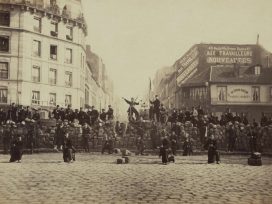
 The Women of Gavril can be read as a metaphor about the fatum of creation and its meaning, having as its topic the most female of all artistic skills – weaving. To weave, according to the dictionaries of symbols, means to create things out of their own essence – much like the spider creates its own web. The ancient Greek myth about the Thracian king Tereus, his wife Procne and her sister Philomela is considered to be a parabola of the archetype structure of female writing, precisely because of the woven encrypted message by Procne. Tereus, suddenly in love with Philomela, pronounces Procne dead, locking her up among the women slaves and ordering her tongue to be cut out, so that she cannot tell anyone about her destiny. This literary trait – woman and the art of weaving – is also present in the myth about Arachne, or Homer’s Penelope, who undid at night the things she was weaving, so that she could buy some time, and similarly to Scheherazade and her stories deliberately left unwoven from night to night.
The Women of Gavril can be read as a metaphor about the fatum of creation and its meaning, having as its topic the most female of all artistic skills – weaving. To weave, according to the dictionaries of symbols, means to create things out of their own essence – much like the spider creates its own web. The ancient Greek myth about the Thracian king Tereus, his wife Procne and her sister Philomela is considered to be a parabola of the archetype structure of female writing, precisely because of the woven encrypted message by Procne. Tereus, suddenly in love with Philomela, pronounces Procne dead, locking her up among the women slaves and ordering her tongue to be cut out, so that she cannot tell anyone about her destiny. This literary trait – woman and the art of weaving – is also present in the myth about Arachne, or Homer’s Penelope, who undid at night the things she was weaving, so that she could buy some time, and similarly to Scheherazade and her stories deliberately left unwoven from night to night.